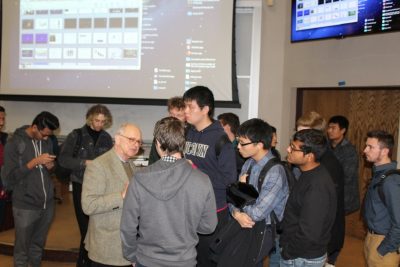The Katzenstein Distinguished Lectures series continued in the 2018 academic year with its twenty second Nobel Laureate lecturer, with an October 26, 2018 lecture by Professor Rainer Weiss of the Massachusetts Institute of Technology.
The title of Professor Weiss’ talk was “Exploration of the Universe with Gravitational Waves”, with abstract:
The observations of gravitational waves from the merger of binary black holes and from a binary neutron star coalescence followed by a set of astronomical measurements is an example of investigating the universe by “multi-messenger” astronomy. Gravitational waves will allow us to observe phenomena we already know in new ways as well as to test General Relativity in the limit of strong gravitational interactions – the dynamics of massive bodies traveling at relativistic speeds in a highly curved space-time. Since the gravitational waves are due to accelerating masses while electromagnetic waves are caused by accelerating charges, it is reasonable to expect new classes of sources to be detected by gravitational waves as well. The lecture will start with some basic concepts of gravitational waves, briefly describe the instruments and the methods for data analysis that enable the measurement of gravitational wave strains of one part in 10 to the 21, and then present the results of recent runs. The lecture will end with a vision for the future of gravitational wave astrophysics and astronomy.

In 2017 Professor Weiss shared the Nobel Prize in Physics with Professor Kip Thorne and Professor Barry Barish for their epochal discovery of gravitational waves, waves that had been predicted by Albert Einstein using his General Theory of Relativity no less than a hundred years before.
Professor Rainer Weiss received his BS degree from MIT in 1955 and his PhD from MIT in 1962. He was on the faculty of Tufts University from 1960 to 1962, and did post-doctoral research at Princeton from 1962 to 1964. He joined the MIT faculty in 1964 and remained a regular faculty member there until he became emeritus in 2001. Along with Kip Thorne, the late Ronald Drever and Barry Barish he spearheaded the development of LIGO, the Laser Interferometer Gravitational-Wave Observatory, a set of two interferometers, one located in Louisiana and the other in Washington State. The interferometers would jointly look for gravitational wave signals seen in coincidence, and in September 2015 made the very first detection of gravity waves. At Louisiana State University he has served as an Adjunct Professor of Physics since 2001. As well as research in gravity waves Professor Weiss’ other primary interests are in atomic clocks and cosmic microwave background measurements.
Dr. Weiss had previously visited the University of Connecticut in Fall 2015 as part of a lecture series that fall given at the University of Connecticut in commemoration of the hundredth year of Einstein’s development of his Theory of General Relativity. At that time Dr. Weiss described the ongoing search at LIGO for gravity waves produced by the merger of two black holes. And the initial announcement of a discovery was made in February 2016, shortly after Dr. Weiss’s visit to the University of Connecticut. It is also of interest to note that Dr. Shep Doeleman of Harvard University was another of the speakers at the Fall 2015 University of Connecticut Einstein commemoration. He talked about the ongoing effort to actually detect the event horizons associated with black holes using the Event Horizon Telescope, black holes being yet another prediction of Einstein’s Theory that was also one hundred years old. And in 2019 Dr. Doeleman announced the very the first direct detection of a black hole event horizon. Thus, with the first detection of gravity waves produced by black hole mergers and then the detection of an event horizon itself, the theory of black holes is put on a very secure observational foundation. This lecture can be viewed: https://www.uctv14.com/ucspanblog/2018/12/10/katzenstein-distinguished-lecture-october-26th-2018?rq=Katzenstein